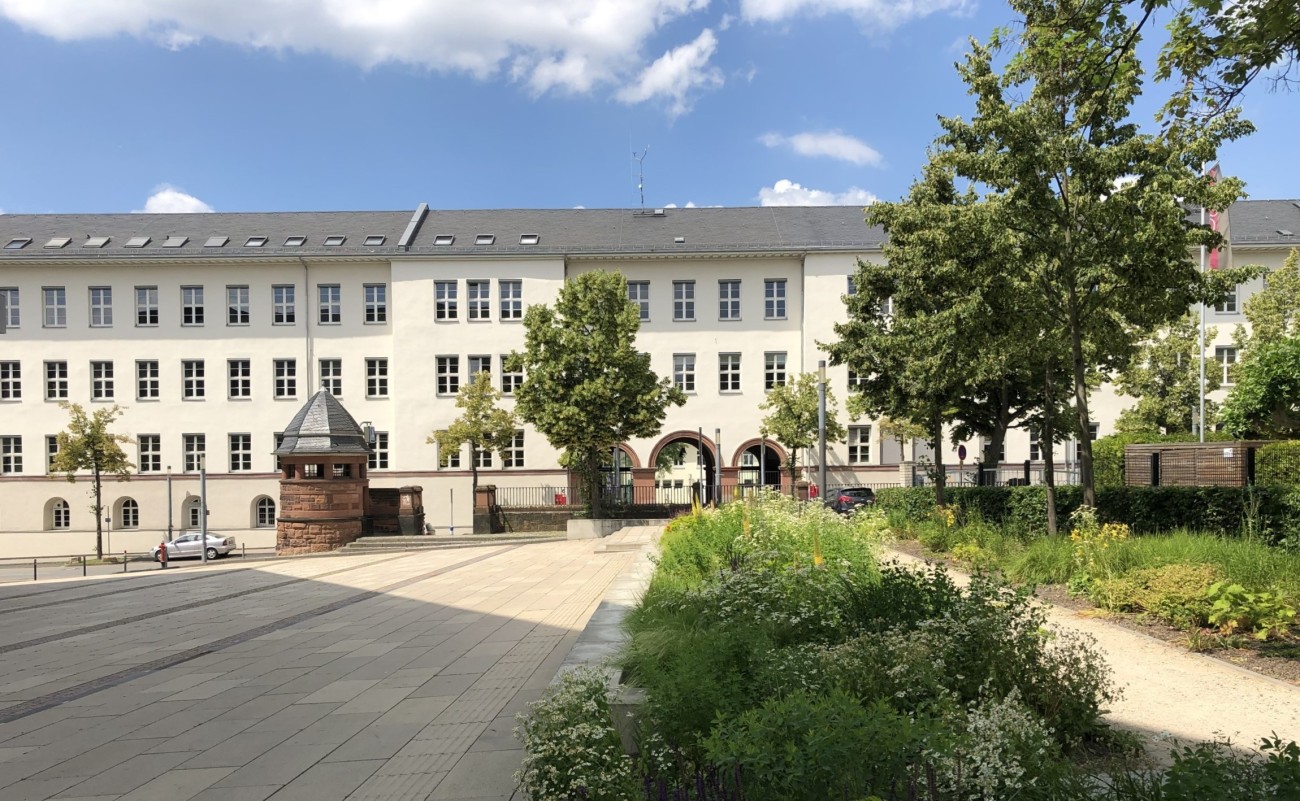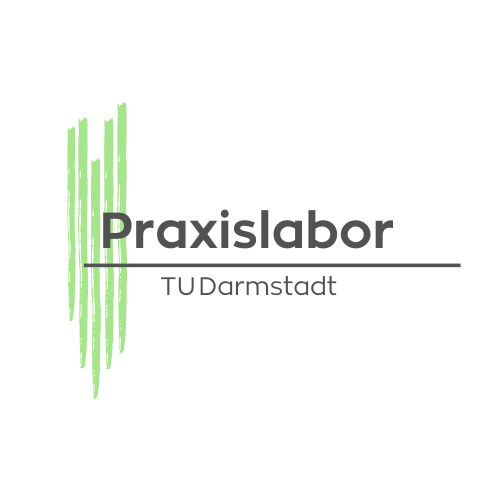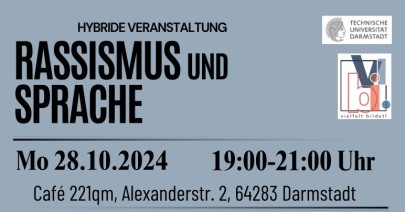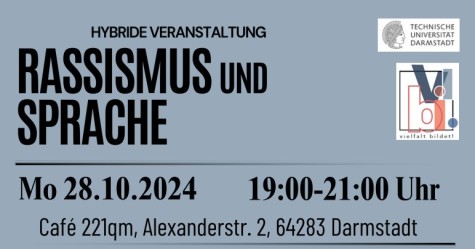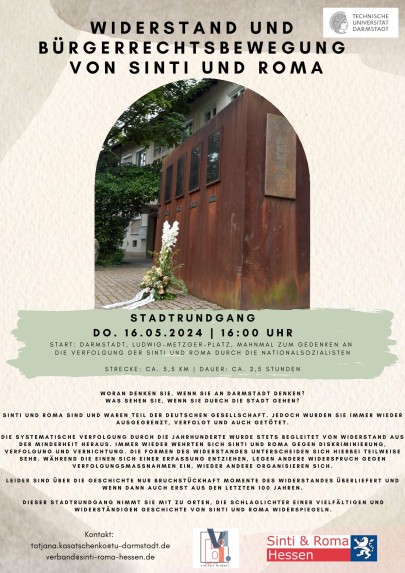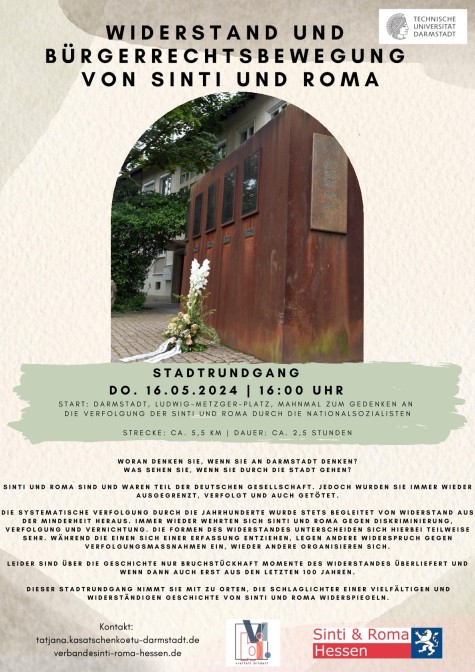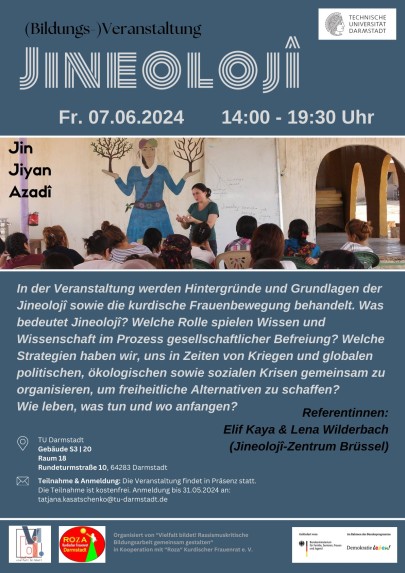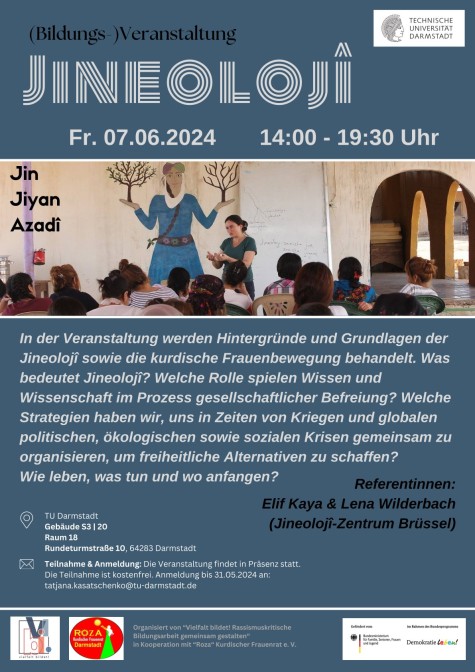The aim of the “Vielfalt bilder” (‘Diversity educates!’) project, which started in 2020, is to sensitise prospective educational multipliers, teachers and educators to racism. As educational institutions with an underrepresentation of people of colour and young people with a history of migration, universities are socialised institutions that are part of the structural reproduction of racism and social inequality. At the same time, they also have the potential to provide discourse approaches that question existing socio-economic conditions, narratives and structures of prejudice.
Recommended external content
We have selected external content from YouTube for you and would like to show it to you right here. To do this, you must reveal it with one click. You can hide the external content at any time with another click.
I agree to external content from YouTube being shown to me. This may result in personal data being transmitted to third-party platforms. You can find more information in our Privacy Policy.
Hybrid event on Jineolojî
Fri 13 Dec 2024 16:00-18:00
The event will deal with the background and basics of Jineolojî and the Kurdish women's movement. What does Jineolojî mean? What role do knowledge and science play in the process of social liberation? What strategies do we have to organise ourselves together in times of war and global political, ecological and social crises in order to create liberal alternatives?
How to live, what to do and where to start?
Location: TU Darmstadt S1/13 Room 6 (Alexanderstr. 6, ground floor; Darmstadt)
Zoom: https://tu-darmstadt.zoom-x.de/j/69980607288
Meeting ID: 699 8060 7288
Ort: TU Darmstadt S1/13 Raum 6 (Alexanderstr. 6 im EG; Darmstadt)
Zoom: https://tu-darmstadt.zoom-x.de/j/69980607288
Meeting-ID: 699 8060 7288
Contactt: tatjana.kasatschenko@tu-…
Digital Talk – Experiences of discrimination and ways of dealing with discrimination at universities
Tuesday, 26 November 2024 | 14:00 – 16:00 hrs
The event follows on from the specialist forum on anti-discrimination, which took place in spring 2024 at TU Darmstadt in spring 2024 and explores the questions raised there in greater depth:
- How widespread are experiences of discrimination at universities?
- What categories of difference underlie experiences of discrimination?
- Which marginalisations and exclusions are experienced during studies and in experienced during studies and in academia?
- What effects do experiences of discrimination have on the sense of belonging to the university?
- What ways of dealing with discrimination exist?
- And which anti-discrimination strategies are effective?
Fatma Aslan (AStA anti-discrimination officer), Lea Belz (Diversity Education Office), Dr Z. Ece Kaya (Project: Diversity educates!), Márcia Moser (Anti-discrimination officer) will address these questions.
Susanne Pawlewicz (Project: Confronting Classism: Promoting Participation and Equal Opportunities at the University) and Kassandra Wuttig (Project: Confronting Classism: Promoting Participation and Equal Opportunities at the University; moderator).
The event is aimed at TU members of all status groups. External participants are also welcome.
Zoom access: https://tu-darmstadt.zoom-x.de/j/81299785365?pwd=YzdSek9GMTBLaEZUSStUUTlOcXA4dz09
The Vibi! project invites you to the hybrid event ‘Racism and Language’ on 28 October 2024 at 7-9 pm.
Together with representatives from self-organisations and migrant self-organisations, we will discuss racist discriminatory language and racist discriminatory language, listen to a practical report from the ‘Initiative N-Wort stoppen’ and explore the question of how language (re-)produces racism, but can also counteract it through self-critical perspectives.
The event is organised in cooperation with the AStA of the TU Darmstadt, the Initiative Schwarze Menschen (ISD), the Bertolt-Brecht-Schule Darmstadt and the GinCo e.V.. It is aimed at students and lecturers, particularly in educational subjects, (prospective) teachers and interested members of the public.
No registration is required for participation on site in the Cafe 221qm of the AStA of the TU Darmstadt. Participation is free of charge. Please register informally for digital access at ece.kaya@tu-darmstadt.de by 25.10.24.
You can find the flyer for the event here (opens in new tab)
In cooperation with the Anne Frank Educational Centre (Frankfurt), the Vibi! project invites you to a digital event as part of the TU's Diversity Month.
The digital workshop ‘How to stay in dialogue? Foundations for dialogue spaces on anti-Semitism & racism in the context of 7.10. at universities’ on 23.05.24 (Thurs.) at 10:00-14:30 (incl. 30 min. lunch break) is organised as part of the Diversity Month of the TU and aims to provide a space for exchange and to provide impulses for discussing and making it possible to discuss reactions to the Middle East conflict in the university context. The workshop is intended to contribute to raising awareness and creating spaces for peaceful dialogue.
University lecturers, students of pedagogy and teaching at TU Darmstadt, but also interested university lecturers and political educators from other universities and institutions are particularly invited.
As workshop places are limited, please register informally as soon as possible at: ece.kaya@tu-darmstadt.de. Participation is free of charge.
The event deals with the background and foundations of the
Jineolojî and the Kurdish women's movement.
What does Jineolojî mean? What role do knowledge and
science play in the process of social liberation? Which
What strategies do we have to fight together in times of war and global
political, ecological and social crises to organise together
organise ourselves together to create liberal alternatives?
How to live, what to do and where to start?
Speakers:
Elif Kaya & Lena Wilderbach
(Jineolojî Centre Brussels)
TU Darmstadt
Building S3 | 20, Room 18
Rundeturmstraße 10, 64283 Darmstadt
Participation & registration: The event will take place in presence.
Participation is free of charge. Registration until 31.05.2024 to:
tatjana.kasatschenko@tu-darmstadt.de
In cooperation between the Institute for General Education and Vocational Education at TU Darmstadt
- the migrant self-organisations GinCo e. V. and Roza e. V.,
- the self-organisation Initiative Schwarze Menschen in Deutschland Bund e.V. ,
- the Association of German Sinti and Roma – Regional Association of Hesse,
- the Anne Frank Educational Centre and
- the Heinrich-Emanuel-Merck-School Darmstadt
- the Bertolt-Brecht-School Darmstadt
- the Bergstraße School Village
the project aims to develop and test educational programmes that enable educational confrontation with racism and discriminatory structures at various levels. In this way, the expertise of civil society self-organisations is to be recognised and the broadest possible target group reached. Academic approaches to the topic of racism are deliberately combined with non-university educational work and the university as a place of education is opened up to diverse perspectives. The project is also a member of the South Hesse Anti-Discrimination Network.
In line with the basic participatory approach, collaboration with various co-operation partners plays a key role in the ‘Diversity educates!’ project. The Anne Frank Educational Centre as a non-university educational institution and the Association of German Sinti and Roma – State Association of Hesse as the representative body of the Sinti and Roma minority living in Hesse are important players in the joint work on and with offers in the field of racism criticism and enable a broad spectrum of thematic focuses and educational formats. In addition, the organisations GinCo e.V., Initiative Schwarze Menschen in Deutschland Bund e.V. and Roza e.V. are also involved in the project, each of which has a different focus and is politically committed to social participation and against discrimination. The cooperation with the Heinrich-Emanuel-Merck-Schule, the Bertolt-Brecht-Schule and the Schuldorf Bergstraße, which serves as a learning environment for prospective teachers, also makes it possible to bring the thematic focus of the project to pupils and teachers. In this way, reciprocal – often hidden and unconscious – discrimination processes in their own institutions (school/university) can be revealed and starting points for change can be identified.
The aim of the project is to create educational programmes that are critical of racism within and outside the university together with the cooperation partners and to open up the university to civil society actors through different concepts and formats, as well as to expand the university's radius of action in society. This is done with the aim of dismantling racist structures in society as a whole and in educational institutions in particular.
Multipliers in educational work with children, young people and/or adults make a decisive contribution to maintaining dominant knowledge in central educational institutions. Racist, but also heteronormative structures are an integral part of existing knowledge systems in relation to (non-)belonging and play a significant role in shaping educational institutions such as schools as well as extracurricular educational institutions. Implicit knowledge about ‘others’ has an effect in curricular educational content on the one hand, but also in the everyday processes and routines of educational institutions on the other (cf. Broden/Mecheril 2010; Gomolla/Radtke 2007), and this is particularly profound due to their function as ‘knowledge mediators’. Current research findings on the views of educators with regard to the topic of migration make it clear that a reflexive and anti-discriminatory approach and the necessary debate is still far from being the norm or an integral part of the profession and (university) education (cf. Doğmuş/Karakaşoğlu/Mecheril 2016; Leiprecht/Steinbach 2015).
In schools in particular, a deficit-oriented view of migration still often dominates, which has a considerable influence on both the expectations of pupils and parents and the judgement of teachers. At the same time, it is clear that even university teaching is not free from (unconscious) racist patterns of differentiation, which can also contribute to an unequal distribution of educational opportunities between students. Attributions to students based on skin colour, religious and cultural affiliation, national origin, etc. often go hand in hand with derogatory assumptions and assessments of their social behaviour, performance and general predictions about ‘ability’ and potential.
The ‘Diversity educates!’ project regularly designs various formats for educational events.
To this end, the practical laboratory of the Institute of General and Vocational Education always works together with at least one of the co-operation bodies involved in the project. Among other things, seminars are jointly prepared for the pedagogical major study programmes and teacher training courses at the TU and corresponding teaching assignments are awarded.
| Name | Working area(s) | Contact | |
|---|---|---|---|
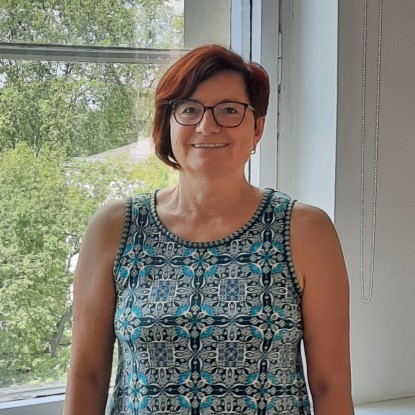
| Dr. Olga Zitzelsberger | olga.zitzelsberger@tu-... +49 6151 16-23970 S1|13 105 | |
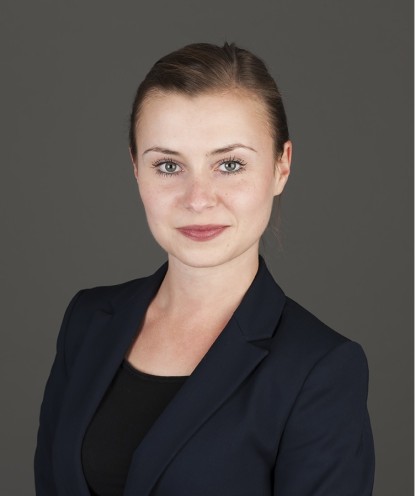
| Dr. Tatjana Kasatschenko | tatjana.kasatschenko@tu-... +49 6151 16-23973 S1|13 105a | |
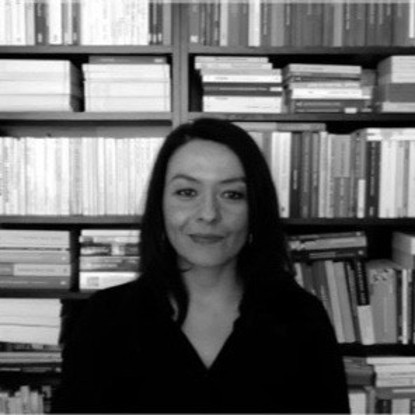
| Dr. Z. Ece Kaya | ece.kaya@tu-... +49 6151 16 23972 S1|13 125 | |
|
A
| Samya Johanna Arbes B.A. | samyajohanna.arbes@stud.tu-... S1|13 | |
|
A
| Fatma Aslan B.A. | Diskriminierung_gemeinsam_bewaeltigen@web.de | |
|
W
| Alicia Wollenhaupt | alicia.wollenhaupt@stud.tu-... | |
|
W
| Anastasia Duka Wolf | anastasia.duka-wolf@stud.tu-... S1|13 | |
|
F
| Aline Fruhauf-Zubi | aline.fruhauf-zubi@stud.tu-... | |
|
S
| Sara Samir | sara.samir@stud.tu-... |
| 2024 |
|
| 2023 |
|
| 2022 |
|
| 2021 |
|
| 2020 |
|
- Broden, Anne/Mecheril, Paul (Hrsg.): Rassismus bildet. Bildungswissenschaftliche Beiträge zur Normalisierung und Subjektivierung in der Migrationsgesellschaft. Bielefeld 2010.
- Doğmuş, Aysun/Karakaşoğlu, Yasemin/Mecheril, Paul (Hrsg.): Pädagogisches Können in der Migrationsgesellschaft. Wiesbaden 2016.
- Gomolla, Mechthild/Radtke, Frank-Olaf: Institutionelle Diskriminierung. Die Herstellung ethnischer Differenz in der Schule. Wiesbaden 2007.
- Steinbach, Anja/Leiprecht, Rudolf (Hrsg.): Schule in der Migrationsgesellschaft. Ein Handbuch. Bd. 1: Grundlagen – Differenzlinien – Fachdidaktiken. Schwalbach/Ts. 2015.

